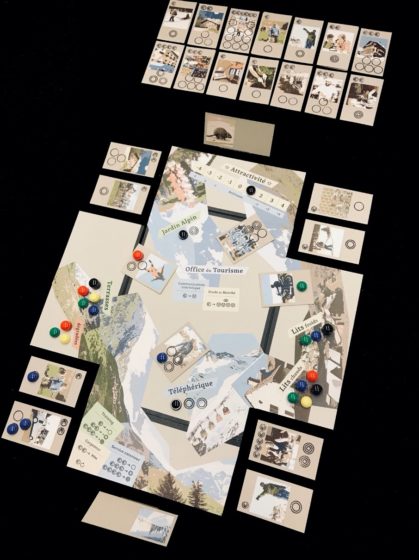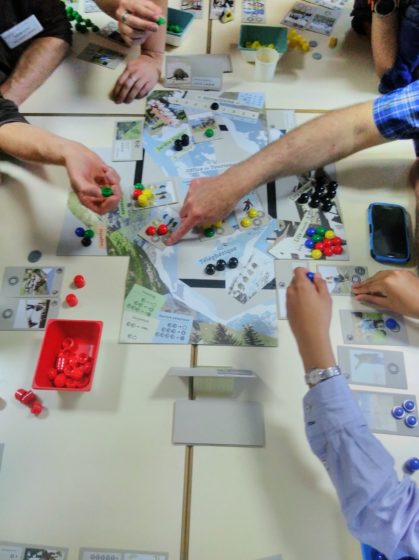
How do we plan the adaptation of mountain territories for the challenges of the future? In particular, how do we maintain key ecosystem services to guarantee their capacity for adaptation? We engaged with stakeholders about these challenges through participatory research, building their vision for the future of their territory and co-designing tools to explore and understand adaptation pathways.
Mountain social-ecological systems are facing important challenges in adapting to an uncertain future. These systems have an amazing potential to produce ecosystem services like clean water, erosion control, agriculture, tourism, etc. However, they are also particularly vulnerable to global change, as they face numerous natural hazards and many policies do not take specificities of these systems into account. Historically, many mountain systems maintained themselves by relying on a pragmatic and opportunistic adaptation to external events (change of policies, trends in markets) and individual flexibility through pluriactivity, allowing them to diversify their income by mobilizing diverse ecosystem services.
We conducted a transdisciplinary project in Switzerland (Oberwallis) and France (Pays de la Meije) to explore, together with local stakeholders, the different paths and options for their future. It is a necessary endeavour as these systems seems more used to short term reaction to external events rather than long-term planning.

On each site, we co-constructed together with stakeholders a broad and desirable vision for their near future in 2040. We then designed a serious game to explore with inhabitants how they could – or could not – achieve this vision for their territory. A game is not reality, but the discussions and workshops with participants and scientists after this experience are. We drew lessons from observing their behaviours and listening to their discussions about region adaptive capacity. We also evaluated if such experience and participation in a transdisciplinary process was able to produce social learning and enhance the capacities of the system to innovate and adapt in the future. In parallel, we also looked into how networks of collaborators can be evaluated, and subsequently transformed, to support the achievement of the desired visions through innovation.

Altogether, we found that governance, collective action, and solidarity seem to be the key features for ecosystem-based adaptation in the future. In this regard, differences between Switzerland and France political system appeared to be critical. The latter, more centralized, seems to generate more difficulty for inhabitants to solve local problems by themselves. In comparison, decentralized Switzerland seems to generate fewer issues regarding the local capacity to adapt and solve problems in pursuing their visions.
Dr. Victor Blanco is a postdoctoral researcher at the Planning of Landscape and Urban Systems group, and a group leader at the Institute of Science, Technology and Policy, at ETH Zürich.
Enora Bruley is a PhD student at the Alpine Ecology Laboratory in Grenoble, France. She studies mountain social-ecological systems adaptation.
Dr. Nicolas Salliou is a postdoctoral researcher at the Planning of Landscape and Urban Systems group. He’s specialized in participatory modelling with a focus on social and individual change and transitions. Contact: nsalliou@ethz.ch
Dr. Sandra Lavorel is a CNRS senior research scientist at the Alpine Ecology Laboratory in Grenoble, France. She coordinates research on ecosystem services and how they can support climate change adaptation. Dr Lavorel is a member of the IPBES Multidisciplinary Expert Panel.
Prof. Dr. Tobias Luthe (AHO) is Senior Research Scientist ETH Zurich PLUS, Associate Professor for Systemic Regenerative Design at The Oslo School of Architecture and Design, and Visiting Professor at Politecnico Torino. He is co-founding director of the MonViso Institute (MVI), a real-world laboratory for sustainability transitions and regenerative design in the Italian Alps.